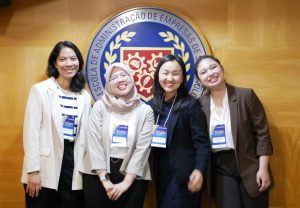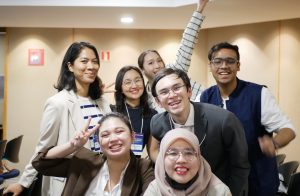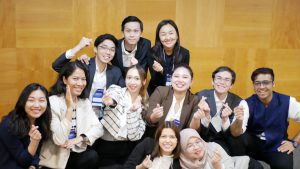Brazil has established food and nutrition security policies in the past and has been, in fact, recognized by the international community as a model country. Yet, it is now back on the hunger map. Food insecurity has been caused by a combination of factors: regulatory gaps, climate change, and the pandemic, among many others. Unfortunately, these prompted the rise of malnutrition in the country, especially among children. According to UNICEF, 30% of Brazilian children, particularly indigenous children are affected by chronic malnutrition. And they are 16 times more susceptible to such conditions due to genetics and, most importantly, to deep-rooted inequalities.
To address malnutrition, our proposal, the Indigenous Children Nutrition Care (ICNC), goes beyond changing school meals. It is a tailored program that incorporates health and nutrition education activities in indigenous schools’ curricula, combined with a monitoring mechanism for the students to ensure the improvement of their health outcomes. It features a bottom-up approach – advocating for the indigenous community’s sovereignty by engaging their participation in the design and implementation. It includes activities such as the adoption of indigenous food preparation and the promotion of school and community gardens. It envisions tackling malnutrition not just within the confines of the classroom, by extending health and food security awareness activities to the rest of the community in the area. Lastly, it highlights partnerships with multiple stakeholder groups, including international partners, in responding to the financial and technical needs in the delivery of the program. ICNC will be piloted in an IP school in Vanuire village, São Paulo, and is intended to be rolled out to other indigenous schools within the state and potentially across the country. Stakeholder consultation, implementation, monitoring, evaluation, and refinement are set to run for 3 years, after which the program will be handed over to the government of SP.

Members
Nadiah Suhaima Ghina is a second-year student in the MPP/IP program at GraSPP. Originally from Indonesia, Nadiah earned her Bachelor of Public Administration from the University of Indonesia and worked at the Ministry of State Secretariat prior to joining UTokyo. Her experience at the office, which provides technical, administrative, and analytical support to the President and Vice President in the exercise of their state powers, equipped her with a deep understanding of the challenges facing public policymakers. In her free time, she enjoys taking impromptu photos of her friends and surroundings.
Luche Tanael is a Master of Public Policy candidate at GraSPP. Prior to her studies at GraSPP, she worked to reform the investment environment of the Philippines by advocating for economic liberalization bills in the country’s Congress. Her current interests are in financial inclusion for micro, small, and medium enterprises, and political communication. Luche holds a B.A. in Political Economy from the University of Asia and the Pacific.
Millicent Faith Tomada is currently in her second year pursuing a Master of Public Policy at GraSPP. Prior to joining UTokyo, her professional background was in the field of human resources management. She has worked in the private sector and for an international organization based in Manila, Philippines, handling various functions in workforce planning, organizational development, compensation & benefits, and learning & development domains. She has also worked as a project consultant in the education sector, designing foreign language curricula for select private high schools. Her research interests include human resource development, rural/international development, public health, climate change, and international cooperation. She earned her bachelor’s degree from the University of the Philippines Diliman.
Zolzaya Enkhtur is a second-year MPP/IP student at GraSPP. She joined the Bank of Mongolia, the central bank, in 2013 as an economist at the Public Education and Information Center. From 2016, she served as a specialist at the Press and Information Unit until mid-2021 before becoming a Japan-IMF Scholarship Program for Asia (JISPA) scholar to pursue graduate studies at GraSPP. Her research interest includes central bank independence and its communication, behavioral economics and big data. Along with her work and studies, she loves traveling, meeting people from different cultures and backgrounds, and enjoy making connections.
Kamila de Sousa Aben Athar Alencar is a master’s candidate in the GraSPP and JICA’s SDG Global Leader Program fellow. She is Brazilian and holds a bachelor’s degree in International Relations from the University of Brasilia. Prior to joining GraSPP, Kamila worked as a Technical Consultant at the Center for Strategic Studies and Management (CGEE), a think tank linked to the Brazilian Ministry of Science, Technology, and Innovations. Currently, Kamila works as an intern at the OECD, under the Innovation Policies for Space and Oceans Unit. Her research focuses on international cooperation, science and technology, sustainable development, and regional development.
Student report
Once-in-a-lifetime experience in Brazil
As a participant in the 2023 GPPN Conference hosted by FGV EAESP in São Paulo, Brazil, I am delighted to report on my enriching experience over the two-day event. The conference brought together students and academics to discuss policy challenges in an increasingly divided world. Through insightful discussions, presentations, and debates, the conference succeeded in providing a unique platform to share knowledge, learn from each other, and identify possible solutions to complex policy problems.
One of the highlights of the conference was the opportunity to present our policy proposal, the Indigenous Child Nutrition Care (ICNC), which aims to tackle food insecurity and promote food sovereignty in indigenous communities through a tailored nutrition program. The proposal received positive feedback from other students and even the FGV-EAESP Professor.
In addition to presenting our proposal, I had the opportunity to listen to several other presentations on a wide range of topics related to public policy. I was impressed by the quality of research and analysis presented by students from prestigious public schools around the world. The presentations were insightful and thought-provoking, and I learned a lot from the discussions that followed. I also had the opportunity to network with other participants, which provided an excellent opportunity to exchange ideas and perspectives on different policy issues. The external activity was insightful as well, as Professor Guilherme Casarões took us on a walking tour around Paulista Avenue and explained the historical events and stories on the buildings and museums we saw and visited.

Overall, the conference was an excellent platform for learning, sharing knowledge, and networking. It provided me with a unique opportunity to present our policy proposal, learn from other students’ presentations, and engage in insightful discussions with academics from top public policy schools in the Global Public Policy Network. I believe that this experience will contribute significantly to my academic experience and even my career in the future. It has helped me broaden my knowledge and understanding of public policy challenges and how we should be aware of stakeholder interests. It has also provided me with a valuable network of contacts that I can call upon for future research collaborations and policy initiatives.

In conclusion, I would like to express my gratitude to the organizers of the conference, FGV EAESP, for putting together such an enriching event. I would also like to thank our team for their hard work and dedication in developing our policy proposal, the Indigenous Child Nutrition Care. And last but not least, I would like to extend my heartfelt thanks to the Graduate School of Public Policy, University of Tokyo for their support in our participation in the 2023 GPPN Conference, especially our supervisors Prof. Kazuyo Hanai and Prof. Hiroshi Suzuki. Their support made it possible for us to attend this enriching event and present our policy proposal, the Indigenous Child Nutrition Care. The conference has been an exceptional opportunity to showcase our work and learn from the experience of others. I look forward to applying the knowledge and skills I gained at the conference to further contribute to finding solutions to the policy challenges of an ever more divided world.
Written by Nadiah Suhaima Ghina, 2nd year MPP/IP

